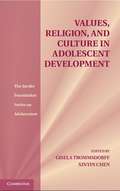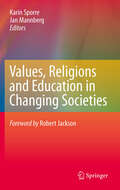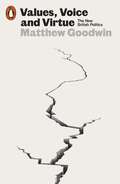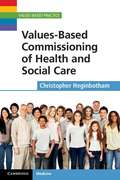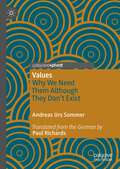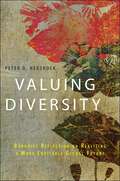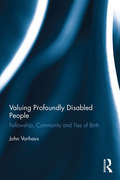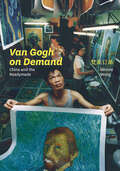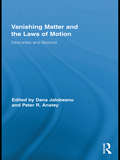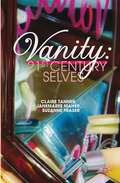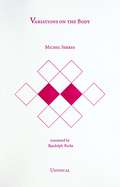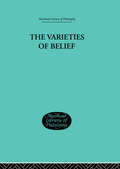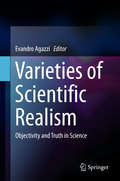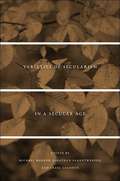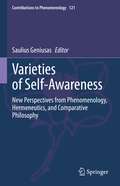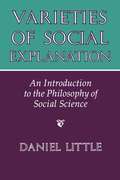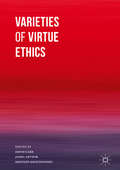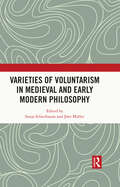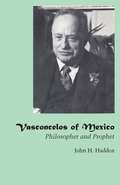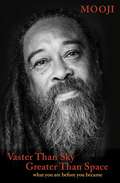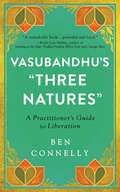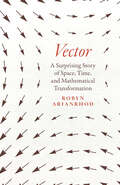- Table View
- List View
Values, Religion, and Culture in Adolescent Development
by Xinyin Chen Gisela TrommsdorffCultural values and religious beliefs play a substantial role in adolescent development. Developmental scientists have shown increasing interest in how culture and religion are involved in the processes through which adolescents adapt to environments. This volume constitutes a timely and unique addition to the literature on human development from a cultural-contextual perspective. Editors Gisela Trommsdorff and Xinyin Chen present systematic and in-depth discussions of theoretical perspectives, landmark studies, and strategies for further research in the field. The eminent contributors reflect diverse cultural perspectives, transcending the Western emphasis of many previous works. This volume will be of interest to scholars and professionals interested in basic developmental processes, adolescent social psychology, and the sociological and psychological dimensions of religion.
Values, Religions and Education in Changing Societies
by Karin Sporre Jan MannbergEducation is a societal matter and takes place in relation to societal changes. Today, in many countries, it has to grapple with diversity and differences brought about by migration and changes in gender relations. Questions of values, human rights and the role of religions are raised. In this book scholars from Sweden, Norway, Germany, Great Britain, Canada, Namibia and South Africa discuss the issues above. Similarities as well as differences are highlighted. The varied contributors engage in a North-South dialogue. Among the questions addressed are: Can the Scandinavian countries be understood as more religious than their up-to-date, seemingly secularist reputation has led us to believe? How do some European, Muslim, Christian and secular pupils understand the religious education they receive? Could a global citizenship education, with a gendered understanding as an integral part, be accomplished? 'Diversity' and 'social justice': what does it take to theoretically integrate these two crucial parameters in education, in South Africa, and in Sweden? The role of religious and values education under changing circumstances is explored through the diverse contributions, that also challenge the hegemony of a Western understanding of democracy, among other values. The purpose of this is to assess what could now constitute global educational common ground.
Values, Voice and Virtue: The New British Politics
by Matthew Goodwin*THE SUNDAY TIMES BESTSELLER**A Financial Times 2023 book to watch*'Forceful ... The fundamental thrust of Goodwin's argument is right ... a new centre ground of British politics is being formed - even if both parties have yet to fully comprehend it' The TimesWhat has caused the recent seismic changes in British politics, including Brexit and a series of populist revolts against the elite? Why did so many people want to overturn the status quo? Where have the Left gone wrong? And what deeper trends are driving these changes?British politics is coming apart. A country once known for its stability has recently experienced a series of shocking upheavals. Matthew Goodwin, acclaimed political scientist and co-author of National Populism, shows that the reason is not economic hardship, personalities or dark money. It is a far wider political realignment that will be with us for years to come. An increasingly liberalised, globalised ruling class has lost touch with millions, who found their values ignored, their voices unheard and their virtue denied. Now, this new alliance of voters is set to determine Britain's fate.Sunday Times bestseller, April 2023
Values-Based Commissioning of Health and Social Care
by Christopher Heginbotham ObeHealth and social care commissioning is a values-driven as well as evidence-driven enterprise. However, whereas there has been an expectation that the evidence-base of commissioning should be made fully explicit, the corresponding values-base has been left largely implicit. The book addresses this subject through a detailed discussion of values and values-based practice, illustrated with case examples, and by developing a critique of existing commissioning. This approach enables commissioners to identify and make explicit the often diverse values of all those involved, whether as commissioners, providers or users of services. It provides a skills base and other support processes for working with differences in values held by all those engaged in making commissioning decisions. This will be essential reading for doctors, both experienced and in training, commissioning managers, professional staff in NHS Foundation Trusts and the private sector and all 'at the sharp' end of practice.
Values: Why We Need Them Although They Don’t Exist
by Andreas Urs SommerIn his book, Andreas Urs Sommer reflects on the question of what it really means when everybody’s appealing to values, all the time – the question, fundamentally, of what values actually are. Values explores both of these points, arriving at two intriguing suggestions: Maybe what we call values are just a set of elaborate fictions. And maybe those fictions serve some very important purposes.
Valuing Diversity: Buddhist Reflection on Realizing a More Equitable Global Future
by Peter D. HershockDiversity matters. Whether in the context of ecosystems, education, the workplace, or politics, diversity is now recognized as a fact and as something to be positively affirmed. But what is the value of diversity? What explains its increasing significance? Valuing Diversity is a groundbreaking response to these questions and to the contemporary global dynamics that make them so salient.Peter D. Hershock examines the changes of the last century to show how the successes of Western-style modernity and industrially-powered markets have, ironically, coupled progressive integration and interdependence with the proliferation of political, economic, social, cultural, and environmental differences. Global predicaments like climate change and persistent wealth inequalities compel recognition that we are in the midst of an era-defining shift from the primacy of the technical to that of the ethical. Yet, neither modern liberalism nor its postmodern critiques have offered the resources needed to address such challenges.Making use of Buddhist and ecological insights, Valuing Diversity develops a qualitatively rich conception of diversity as an emerging value and global relational commons, forwarding an ethics of interdependence and responsive virtuosity that opens prospects for a paradigm shift in our pursuits of equity, freedom, and democratic justice.
Valuing Profoundly Disabled People: Fellowship, Community and Ties of Birth (Routledge Research in Special Educational Needs)
by John VorhausGrowing numbers of human beings live with profound and multiple learning difficulties and disabilities. Exploring the moral, social and political implications of this trend, Valuing Profoundly Disabled People addresses questions that are high on policy and practice agendas in numerous regions around the world, including the UK and the EU, the USA, and Australasia. In this important work Vorhaus examines fundamental moral and social questions about profound disability, and each chapter combines a comprehensive review of existing literature with thought-provoking and original philosophical arguments. Vorhaus argues that there is a pressing need to consider the moral and political claims of people whose lives are characterised by extensive impairments, dependency and vulnerability. The book prompts readers to reflect on complex issues relating to the practices of caring, teaching and treating people with profound disabilities in contexts such as education, health care and social policy. Providing a much-needed contribution to the field, this book will be of interest to postgraduates, academics and researchers in a number of distinct and interrelated fields, including disability and impairment, human rights, philosophy, sociology, health and social policy, and education. The book will also be of great interest to practitioners and policymakers seeking to promote the aims of realising human potential and respecting disability.
Van Gogh on Demand: China and the Readymade
by Winnie Won Yin WongIn a manufacturing metropolis in south China lies Dafen, an urban village that famously houses thousands of workers who paint van Goghs, Da Vincis, Warhols, and other Western masterpieces for the world market, producing an astonishing five million paintings a year. To write about work and life in Dafen, Winnie Wong infiltrated this world, first investigating the work of conceptual artists who made projects there; then working as a dealer; apprenticing as a painter; surveying wholesalers and retailers in Europe, East Asia and North America; establishing relationships with local leaders; and organizing a conceptual art exhibition for the Shanghai World Expo. The result is Van Gogh on Demand, a fascinating book about a little-known aspect of the global art world--one that sheds surprising light on the workings of art, artists, and individual genius. Confronting big questions about the definition of art, the ownership of an image, and the meaning of originality and imitation, Wong describes an art world in which idealistic migrant workers, lofty propaganda makers, savvy dealers, and international artists make up a global supply chain of art and creativity. She examines how Berlin-based conceptual artist Christian Jankowski, who collaborated with Dafen's painters to reimagine the Dafen Art Museum, unwittingly appropriated the work of a Hong Kong-based photographer Michael Wolf. She recounts how Liu Ding, a Beijing-based conceptual artist, asked Dafen "assembly-line" painters to perform at the Guangzhou Triennial, neatly styling himself into a Dafen boss. Taking the Shenzhen-based photojournalist Yu Haibo's award-winning photograph from the Amsterdam's World Press Photo organization, she finds and meets the Dafen painter pictured in it and traces his paintings back to an unlikely place in Amsterdam. Through such cases, Wong shows how Dafen's painters force us to reexamine our preconceptions about creativity, and the role of Chinese workers in redefining global art. Providing a valuable account of art practices in an ascendant China, Van Gogh on Demand is a rich and detailed look at the implications of a world that can offer countless copies of everything that has ever been called "art. "
Vanishing Matter and the Laws of Motion: Descartes and Beyond (Routledge Studies in Seventeenth-Century Philosophy)
by Dana JalobeanuThis volume explores the themes of vanishing matter, matter and the laws of nature, the qualities of matter, and the diversity of the debates about matter in the early modern period. Chapters are unified by a number of interlocking themes which together enable some of the broader contours of the philosophy of matter to be charted in new ways. Part I concerns Cartesian Matter; Part II covers Matter, Mechanism and Medicine; Part III covers Matter and the Laws of Motion; and Part IV covers Leibniz and Hume. Bringing together some of the world’s leading scholars of early modern philosophy, as well as some exciting new researchers, Vanishing Matter and the Laws of Motion stakes out new territory that all serious scholars of early modern philosophy and science will want to traverse.
Vanishing into Things: Knowledge in Chinese Tradition
by Barry AllenVanishing into Things explores the concept of knowledge in Chinese thought over two millennia, from Confucius to Wang Yangming (ca. 1500 CE), and compares the different philosophical imperatives that have driven Chinese and Western thought. Challenging the hyperspecialized epistemology of modern philosophy in the West, Barry Allen urges his readers toward an ethical appreciation of why knowledge is worth pursuing.<P><P>Western philosophers have long maintained that true knowledge is the best knowledge. Chinese thinkers, by contrast, have emphasized not the essence of knowing but the purpose. Ideas of truth play no part in their understanding of what the best knowledge is: knowledge is not deduced from principles or reducible to a theory. Rather, in Chinese tradition knowledge is expressed through wu wei, literally “not doing”―a response to circumstances that is at once effortless and effective. This type of knowledge perceives the evolution of circumstances from an early point, when its course can still be changed, provided one has the wisdom to grasp the opportunity.
Vanity: 21st Century Selves
by Suzanne Fraser Claire Tanner Janemaree MaherWhat role does 'vanity' play in the lives of 21st century subjects? Exploring a range of fields including public health, information technology, media studies and feminist approaches to the body and beauty, this book offers a broad analysis of how 'vanity' shapes contemporary Western societies and its understandings of selfhood.
Variations on the Body (Univocal)
by Michel SerresWorld-renowned philosopher, Michel Serres writes a text in praise of the body and movement, in praise of teachers of physical education, coaches, mountain guides, athletes, dancers, mimes, clowns, artisans, and artists. This work describes the variations, the admirable metamorphoses that the body can accomplish. While animals lack such a variety of gestures, postures, and movements, the fluidity of the human body mimics the leisure of living beings and things; what&’s more, it creates signs. Already here, within its movements and metamorphoses, the mind is born. The five senses are not the only source of knowledge: it emerges, in large part, from the imitations the plasticity of the body allows. In it, with it, by it knowledge begins.
Varieties of Belief (Muirhead Library Of Philosophy Ser.)
by Paul HelmFirst published in 2002. This is Volume IV of seven in the Library of Philosophy series on the Philosophy of Religion. The Library of Philosophy was designed as a contribution to the History of Modern Philosophy under the heads: first of Different schools of Thought - Sensationalist, Realist, Idealist, Intuitivist; secondly of different Subjects - Psychology, Ethics, Aesthetics, Political Philosophy, Theology. Written in 1973, work in the philosophy of religion in the last thirty years has focused increasingly on the language of religion. Too often it seems that unless one happens to share the particular religious outlook of the writer, religious or theological premises are being made to yield philosophical conclusions. There is an obvious need for a less question-begging procedure, one that separates the philosophy from the religion. The aim of the study is to make a point about philosophical methodology no grounds are offered for preferring one analysis of religious belief to another.
Varieties of Moral Personality: Ethics and Psychological Realism
by Owen FlanaganOwen Flanagan argues in this book for a more psychologically realistic ethical reflection and spells out the ways in which psychology can enrich moral philosophy. Beginning with a discussion of such “moral saints” as Gandhi, Mother Teresa, and Oskar Schindler, Flanagan charts a middle course between an ethics that is too realistic and socially parochial and one that is too idealistic, giving no weight to our natures.
Varieties of Scientific Realism
by Evandro AgazziThis book offers a comprehensive update on the scientific realism debate, enabling readers to gain a novel appreciation of the role of objectivity and truth in science and to understand fully the various ways in which antirealist conceptions have been subjected to challenge over recent decades. Authoritative representatives of different philosophical traditions explain their perspectives on the meaning and validity of scientific realism and describe the strategies being adopted to counter persisting antirealist positions. The coverage extends beyond the usual discussion of realism within the context of the natural sciences, and especially physics, to encompass also its applicability in mathematics, logic, and the human sciences. The book will appeal to all with an interest in the recent realist epistemologies of science, the nature of current philosophical debate, and the ongoing rehabilitation of truth as the legitimate goal of scientific research.
Varieties of Secularism in a Secular Age
by Craig Calhoun Jonathan Vanantwerpen Michael WarnerIn the book a prominent and varied group of scholars chart the conversations in which a secular age intervenes and address wider questions of secularism and secularity.
Varieties of Self-Awareness: New Perspectives from Phenomenology, Hermeneutics, and Comparative Philosophy (Contributions to Phenomenology #121)
by Saulius GeniusasThis collection of chapters, written by prominent scholars in their respective fields, re-examines the nature of self-awareness in both Western and Eastern philosophy, inquires into its diverse and variable modes, and significantly broadens the framework of its analysis. The chapters collected focus on reflective and pre-reflective forms of self-awareness, as well as the relation between self-awareness and the awareness of things and the world. Included are examinations of the affective and embodied dimensions of self-awareness, the distinct forms of self-awareness in memory, phantasy, and dreams, as well as the temporal and spatial nature of self-awareness. This edited volume appeals to students and researchers working in phenomenology and on the philosophy of self-awareness.
Varieties of Social Explanation: An Introduction to the Philosophy of Social Science
by Daniel LittleProfessor Little presents an introduction to the philosophy of social science with an emphasis on the central forms of explanation in social science: rational-intentional, causal, functional, structural, materialist, statistical and interpretive. The book is very strong on recent developments, particularly in its treatment of rational choice theory, microfoundations for social explanation, the idea of supervenience, functionalism, and current discussions of relativism.Of special interest is Professor Little's insight that, like the philosophy of natural science, the philosophy of social science can profit from examining actual scientific examples. Throughout the book, philosophical theory is integrated with recent empirical work on both agrarian and industrial society drawn from political science, sociology, geography, anthropology, and economics.Clearly written and well structured, this text provides the logical and conceptual tools necessary for dealing with the debates at the cutting edge of contemporary philosophy of social science. It will prove indispensible for philosophers, social scientists and their students.
Varieties of Virtue Ethics
by David Carr Kristján Kristjánsson James ArthurThis book explores recent developments in ethics of virtue. While acknowledging the Aristotelian roots of modern virtue ethics - with its emphasis on the moral importance of character - this collection recognizes that more recent accounts of virtue have been shaped by many other influences, such as Aquinas, Hume, Nietzsche, Hegel and Marx, Confucius and Lao-tzu. The authors also examine the bearing of virtue ethics on other disciplines such as psychology, sociology and theology, as well as attending to some wider public, professional and educational implications of the ethics of virtue. This pioneering book will be invaluable to researchers and students concerned with the many contemporary varieties and applications of virtue ethics.
Varieties of Voluntarism in Medieval and Early Modern Philosophy
by Jörn Müller Sonja SchierbaumThis book considers different forms of voluntarism developed from the thirteenth to eighteenth centuries. By crossing the conventional dividing line between the medieval and early modern periods, the volume draws important new insights on the historical development of voluntarism. Voluntarism places a special emphasis on the will when it comes to the analysis and explanation of fundamental philosophical questions and problems. Since the Middle Ages, voluntarist considerations and views played an important role in the development of different theories of action, ethics, metaethics, and metaphysics. The chapters in this volume are grouped according to three distinct kinds of voluntarism: psychological, ethical, and theological voluntarism. They address topics such as the threat of irrationality as the standard objection to voluntarism, incontinent actions and their explanation, the nature of the will as rational appetite, the relationship between intellect and will, the implications of conceptions of the will for political freedom, and the relations between divine freedom and the modal status of eternal truths. The chapters not only consider towering figures of the Middle Ages—Thomas Aquinas, Henry of Ghent, William of Ockham, Francisco de Vitoria—and early modern period—René Descartes, Thomas Hobbes, Gottfried Wilhelm Leibniz, Samuel Pufendorf—but also engage with less well-known figures such as Peter John Olivi, John of Pouilly, Catharine Trotter Cockburn, and Christian August Crusius. Varieties of Voluntarism in Medieval and Early Modern Philosophy will appeal to scholars and advanced students working in medieval philosophy, early modern philosophy, the history of ethics, and philosophy of religion.
Vasconcelos of Mexico: Philosopher and Prophet
by John H. HaddoxJosé Vasconcelos--lawyer, politician, writer, educator, philosopher, prophet, and mystic--was one of the most influential and controversial figures in the intellectual life of twentieth-century Mexico. Vasconcelos was driven by the desire to gain a complete and comprehensive vision of reality, employing his own aesthetic-emotive method and a poetic mode of expression. The complex philosophical system that resulted is what he called "aesthetic monism. " But this is only one side of the man. Vasconcelos was also vitally interested in both the proximate realities and remote possibilities of Mexico, in the character of the "cosmic race" of his homeland, and in the relations between his own country and the others of this hemisphere. Soon after Vasconcelos's death in 1959, Eduardo García Máynez spoke of him, in a moving tribute, as "without question the most inspiring intellectual and human figure that Mexico has produced. " Unhappily--and perhaps disgracefully--he has remained almost unknown outside the Spanish-speaking world. Histories of Mexico published in English usually give passing mention to his role as Minister of Public Education or his unsuccessful campaign for the presidency, but his aesthetic system and his socio-political ideas have been ignored by philosophers in the United States. Here, for the first time, is a unified, inclusive, and occasionally critical presentation of the entire range of Vasconcelos's thought, from his metaphysics and theory of knowledge through his aesthetics and ethics to his social and political philosophy. It is enriched by an appendix in which the most significant passages from Vasconcelos's own philosophical writings are presented in English translations. José Vasconcelos - lawyer, politician, writer, educator, philosopher, prophet, and mystic - was one of the most influential and controversial figures in the intellectual life of twentieth-century Mexico. Vasconcelos was driven by the desire to gain a complete and comprehensive vision of reality, employing his own aesthetic-emotive method and a poetic mode of expression. The complex philosophical system that resulted is what he called "aesthetic monism". But this is only one side of the man. Vasconcelos was also vitally interested in both the proximate realities and remote possibilities of Mexico, in the character of the "cosmic race" of his homeland, and in the relations between his own country and the others of this hemisphere. Soon after Vasconcelos's death in 1959, Eduardo García Máynez spoke of him, in a moving tribute, as "without question the most inspiring intellectual and human figure that Mexico has produced". Unhappily - and perhaps disgracefully - he has remained almost unknown outside the Spanish-speaking world. Histories of Mexico published in English usually give passing mention to his role as Minister of Public Education or his unsuccessful campaign for the presidency, but his aesthetic system and his socio-political ideas have been ignored by philosophers in the United States. Here, for the first time, is a unified, inclusive, and occasionally critical presentation of the entire range of Vasconcelos's thought, from his metaphysics and theory of knowledge through his aesthetics and ethics to his social and political philosophy. It is enriched by an appendix in which the most significant passages from Vasconcelos's own philosophical writings are presented in English translations.
Vaster Than Sky, Greater Than Space: What You Are Before You Became
by MoojiIn ever-growing gatherings worldwide, the revered teacher Mooji has opened the eyes of thousands through his rare ability to shine light on the ineffable with uncommon clarity, humor, and warmth. Now, with Vaster Than Sky, Greater Than Space, Mooji invites and inspires readers everywhere to discover the true essence from which we all arise. The Advaita Vedanta tradition teaches that through simple questioning and introspection, we can awaken to something far greater than the ego self, a nondual Oneness with the ground of Being. In Vaster Than Sky, Greater Than Space, Mooji guides us into the adventure of deep inquiry, sparking direct Self-realization through parables, insights, wisdom teachings, and responses to the common questions of readers. Through our own engagement and self-exploration, Mooji helps us to arrive at the answers, not from the limited perspective in which we've been conditioned, but from our own deepest Knowing--revealing the timeless, boundless love and freedom that is the natural perfume of the Absolute.
Vasubandhu's "Three Natures": A Practitioner's Guide for Liberation
by Ben ConnellyIn this book, Ben Connelly shows the power of integrating early Buddhist psychology with the Mahayana emphasis on collective liberation. You&’ll discover how wisdom from fourth-century India can be harnessed to heal and transform systems of harm within ourselves and our communities. The three natures (svabhavas)—the imaginary, dependent, and complete, realized natures—are inherent aspects of all phenomena. The imaginary nature of things is what we think they are. Their dependent nature is that they appear to arise from countless conditions. The complete, realized nature is that they aren&’t as we imagine them to be: things that can be grasped or pushed away. The three natures form the backbone of Yogacara philosophy, and by showing us how to see beyond our preconceived notions of ourselves and others, beyond the things that we&’re convinced are &“true,&” they open up a path to personal and communal healing. Dive into this empowering approach to freedom from suffering, from harmful personal and social patterns, and to finding peace and joyfulness in the present.
Vaulting Ambition: Sociobiology and the Quest for Human Nature
by Philip KitcherVaulting Ambitionis the first extensive and detailed evaluation of the controversial claims that sociobiologists have made about human nature and human social behavior. It raises the "sociobiology debate" to a new level, moving beyond arguments about the politics of the various parties involved, the degree to which sociobiology assumes genetic determinism, or the falsifiability of the general theory. Sociobiology has made a great deal of noise in the popular intellectual culture. Vaulting Ambition cuts through the charges and counter-charges to take a hard look at the claims and analyses offered by the sociobiologists. It examines what the claims mean, how they relate to standard evolutionary theory, how the biological models are supposed to work, and what is wrong with the headline-grabbing proclamations of human sociobiology. In particular, it refutes the notions that humans are trapped by their evolutionary biology and history in endlessly repeating patterns of aggression, xenophobia, and deceitfulness, or that the inequities of sex, race, and class are genetically based or culturally determined. And it takes up issues of human altruism, freedom, and ethics as well. Kitcher weighs the evidence for sociobiology, for human sociobiology, and for "the pop sociobiological view" of human nature that has engendered the controversy. He concludes that in the field of nonhuman animal studies, rigorous and methodologically sound work about the social lives of insects, birds, and mammals has been done. But in applying the theories to human beings-where even more exacting standards of evidence are called for because of the potential social disaster inherent in adopting a working hypothesis as a basis for public policy - many of the same scientists become wildly speculative, building grand conclusions from what Kitcher shows to be shoddy analysis and flimsy argument. While it may be possible to develop a genuine science of human behavior based on evolutionary biology, genetics, cognition, and culture, Kitcher points out that the sociobiology that has been loudly advertised in the popular and intellectual press is not it. Pop sociobiology has in fact been felled by its overambitious and overreaching creators.
Vector: A Surprising Story of Space, Time, and Mathematical Transformation
by Robyn ArianrhodA celebration of the seemingly simple idea that allowed us to imagine the world in new dimensions—sparking both controversy and discovery. The stars of this book, vectors and tensors, are unlikely celebrities. If you ever took a physics course, the word “vector” might remind you of the mathematics needed to determine forces on an amusement park ride, a turbine, or a projectile. You might also remember that a vector is a quantity that has magnitude and (this is the key) direction. In fact, vectors are examples of tensors, which can represent even more data. It sounds simple enough—and yet, as award-winning science writer Robyn Arianrhod shows in this riveting story, the idea of a single symbol expressing more than one thing at once was millennia in the making. And without that idea, we wouldn’t have such a deep understanding of our world. Vector and tensor calculus offers an elegant language for expressing the way things behave in space and time, and Arianrhod shows how this enabled physicists and mathematicians to think in a brand-new way. These include James Clerk Maxwell when he ushered in the wireless electromagnetic age; Einstein when he predicted the curving of space-time and the existence of gravitational waves; Paul Dirac, when he created quantum field theory; and Emmy Noether, when she connected mathematical symmetry and the conservation of energy. For it turned out that it’s not just physical quantities and dimensions that vectors and tensors can represent, but other dimensions and other kinds of information, too. This is why physicists and mathematicians can speak of four-dimensional space-time and other higher-dimensional “spaces,” and why you’re likely relying on vectors or tensors whenever you use digital applications such as search engines, GPS, or your mobile phone. In exploring the evolution of vectors and tensors—and introducing the fascinating people who gave them to us—Arianrhod takes readers on an extraordinary, five-thousand-year journey through the human imagination. She shows the genius required to reimagine the world—and how a clever mathematical construct can dramatically change discovery’s direction.
